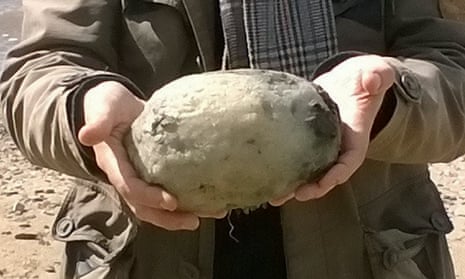A couple in Lancashire are in negotiations with potential buyers after stumbling across a valuable piece of ambergris during a stroll on the beach.
Ambergris, sometimes known as whale vomit, is used by perfumers to make scent last longer and can fetch very high prices because of its rarity. The 1.57kg lump of the substance found by the couple could be worth around £50,000.
Gary and Angela Williams, from Overton, Lancashire, were walking along Middleton Sands beach near Morecambe Bay when they followed the smell of rotting fish to find a greyish lump slightly smaller than a rugby ball. The couple had read about ambergris in a newspaper, so wrapped it in a scarf and took it home.
“It was down a section of the beach where no one really walks,” Gary Williams, an engineer, told the Mirror. “It smells too bad, though. It’s a very distinctive smell, like a cross between squid and farmyard manure.”
“It feels like a rock hard rubber ball. Its texture is like wax, like a candle. When you touch it you get wax sticking to your fingers.”
He added: “If it is worth a lot of money, it will go a long way towards buying us a static caravan. It would be a dream come true.”
The couple are in negotiations with potential buyers in France and New Zealand. A 2.7kg lump was found on the shore in Morecambe in 2013 and was valued at up to £120,000, but this later turned out not to be ambergris. A 1.1kg piece of the substance, found on a beach in Anglesey, Wales, was bought for £11,000 at an auction in Cheshire last September.
Ambergris is secreted in the bile duct and intestines of sperm whales and is thought to be produced to ease the passage of hard, sharp objects that the whale might have eaten.
In response to evidence that whale populations were dwindling, the International Whaling Commission imposed a moratorium on commercial whaling in 1986.
Although ambergris is not necessarily harvested from dead whales, many countries – including Australia and the US – also ban the trade of it as part of a general ban on exploiting whales.

Comments (…)
Sign in or create your Guardian account to join the discussion